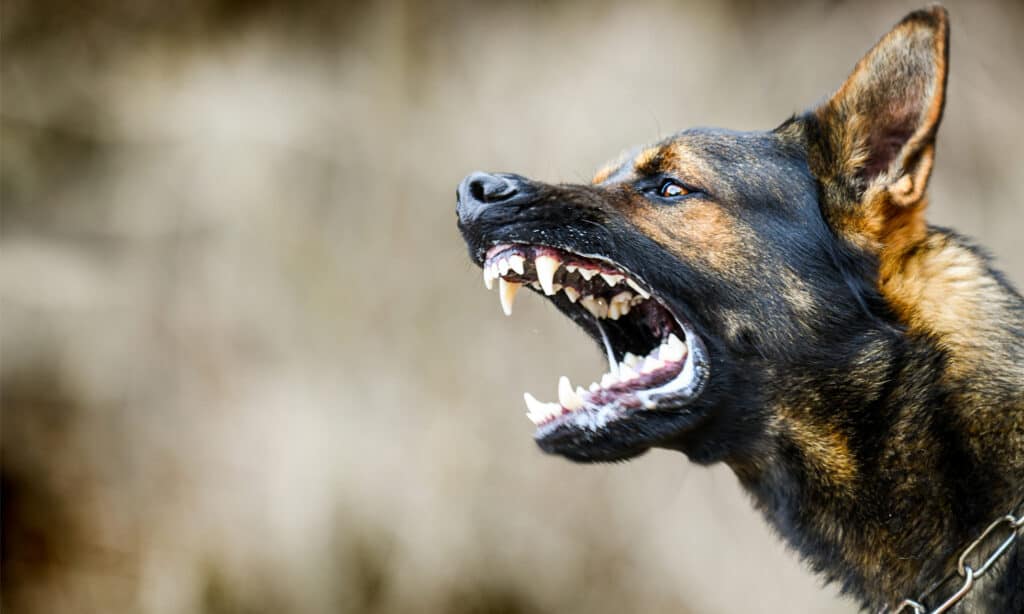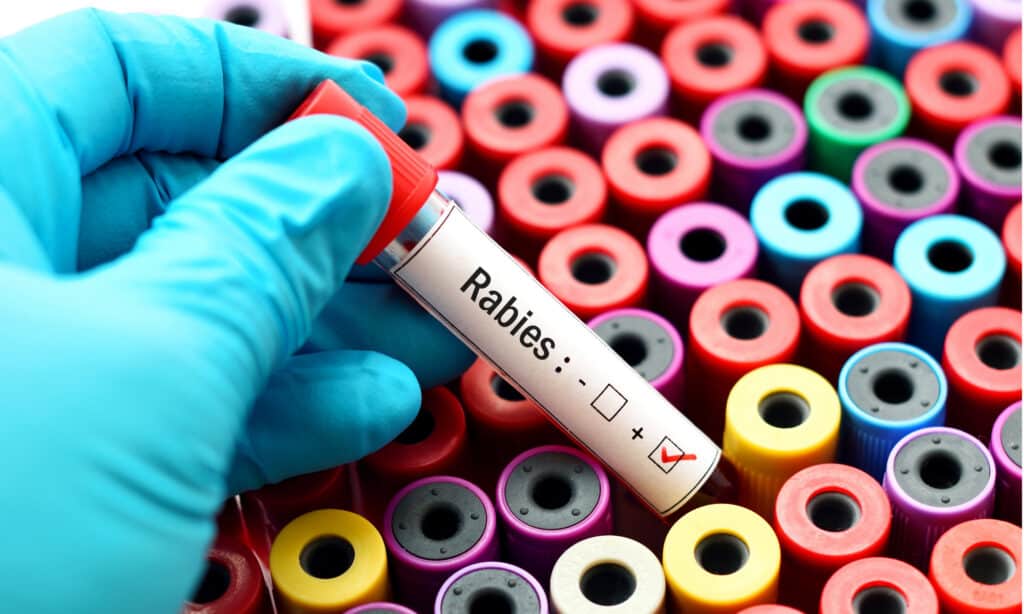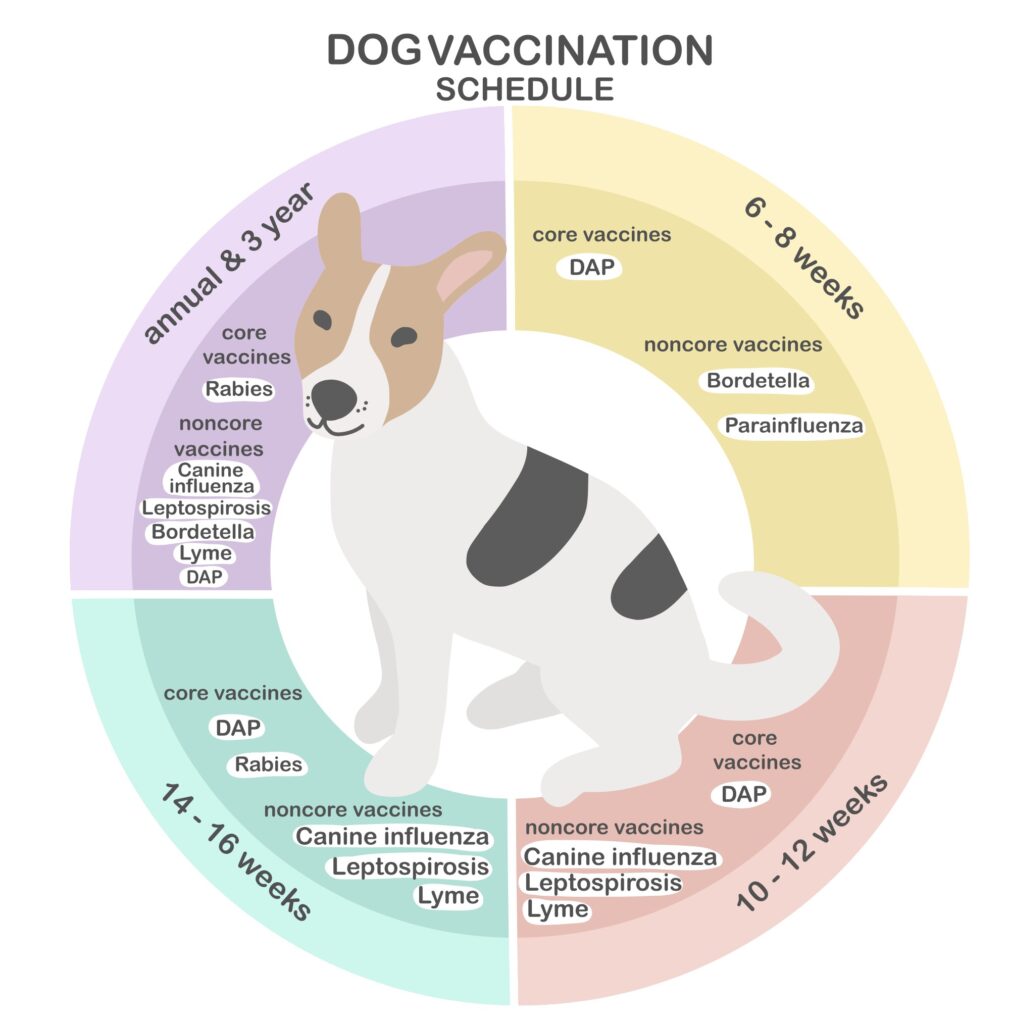Rabies is a viral disease transmitted through contact with an infected animal’s saliva or brain tissue. The virus infects the central nervous system and the brain. There is no test to determine whether a living animal or human is infected. However, once signs of the disease are observed, it is always fatal in mammals, including human beings. The Centers for Disease Control (CDC) estimates that around 59,000 people die from rabies each year. Most rabies cases are found in wild animals. Bats, skunks, foxes, and raccoons are among the more common rabies carriers, but any mammal can get rabies. The good news is the rabies vaccine is highly effective at protecting pets and, by extension, their owners. This is why it’s critical for your dog’s rabies vaccine to be current. Read on to learn how often dogs need rabies shots.

Rabies is transmitted through contact with the saliva of a rabid animal.
©iStock.com/Milan Krasula
Are Rabies Shots for Dogs Legally Required?
In a word, yes. Every U.S. state requires canine vaccination against rabies. It is part of the four core vaccines for dogs. Core vaccines are those that are legally required for every dog. In addition to the rabies vaccine, the other core vaccinations for dogs are given in one shot called DAP, which stands for Distemper, Adenovirus (canine hepatitis), and Parvo.
There is a series of non-core vaccinations that are not legally required but may be recommended based on a dog’s lifestyle, geographic location, and risk of exposure. For example, there is a non-core vaccine to protect dogs from the lethality of a rattlesnake bite. If you don’t live in an area populated by rattlesnakes, this vaccine wouldn’t make sense for your dog. If your dog could encounter a rattlesnake in your area, the vaccine is a very good idea. (The vaccine doesn’t mean a rattlesnake bite has no effect. Instead, it is designed to allow more time to get your dog the needed emergency medical treatment.)

The rabies vaccine is the best defense against the deadly disease.
©iStock.com/arun011
What Age Do Puppies Get Their Rabies Shot?
The laws regarding the rabies vaccination schedule vary from state to state. Most states require a puppy to receive its first rabies shot between 14-16 weeks old. This initial vaccine is then followed by a booster shot one year later.
The initial rabies shot given to puppies triggers an immune response. After that, the dog’s immune system produces antibodies that will fight the rabies virus should the dog ever be exposed. The booster shots the dog will receive throughout its life ensure the antibodies remain at their peak effectiveness.

Get your puppy started on the right foot with the proper vaccinations, including the rabies shot.
©FamVeld/Shutterstock.com
What Are the Side Effects of the Rabies Vaccine?
All rabies vaccines utilized in the United States and Canada are inactivated (killed). Since the rabies vaccine does not administer a live virus, the vaccine cannot cause disease. There can be some side effects, though. Since vaccines trigger the immune system, most of the side effects are related to that stimulated immune response. A mild fever, lethargy, or loss of appetite for 24-36 hours after the vaccine is normal. Mild soreness or swelling at the injection site may also occur. It should be noted, though, that many dogs show no side effects at all after receiving the rabies shot.
Very rare cases of more serious side effects have been reported, such as fainting, vomiting, or diarrhea. Contact your pet’s veterinarian immediately if any of those symptoms are present. But again, these side effects are extremely rare. The rabies vaccine is not only highly effective,e but it has also been proven to be very safe.

Lethargy for 24-26 hours after the rabies vaccine is common.
©Kuznetsov Alexey/Shutterstock.com
How Long Is the Rabies Vaccine Good for Dogs?
Antibodies from the rabies vaccine wane over time, meaning the vaccine loses its efficacy. This is why your dog will need booster shots of the vaccine. After the first initial one-year booster, the schedule generally moves to every three years to maintain peak rabies immunity.
This is where it can get confusing, though. While there are vaccines marketed as three-year doses, there are also vaccines claiming only one-year effectiveness. What is the difference? In reality, there is no difference.
The CDC notes that every rabies vaccine licensed and approved by the United States Department of Agriculture (USDA) must have a three-year minimum duration. Even if a vaccine is labeled as a one-year vaccine, the USDA would not allow it to be commercially available if it did not have a three-year effectiveness span. In short, your dog needs a rabies shot every three years.
However, dog owners need to check the laws in their states. While the USDA mandates three-year effectiveness for all rabies vaccines, some states require annual or biannual revaccination. Your dog’s veterinarian will know what is needed in your state and can help ensure that your dog is both legal and protected against the fatal rabies virus.

Keeping your dog’s vaccines current is one of the best ways to keep them healthy and happy!
©AmySachar/Shutterstock.com
The photo featured at the top of this post is © iStock.com/herraez
Ready to discover the top 10 cutest dog breeds in the entire world?
How about the fastest dogs, the largest dogs and those that are -- quite frankly -- just the kindest dogs on the planet? Each day, AZ Animals sends out lists just like this to our thousands of email subscribers. And the best part? It's FREE. Join today by entering your email below.
Thank you for reading! Have some feedback for us? Contact the AZ Animals editorial team.






